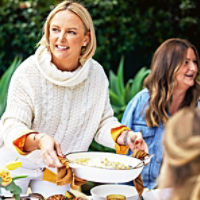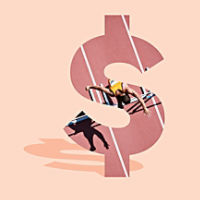This article is from the second issue of CommBank's magazine, Brighter.
Ignore your pay – Max Phelps, Sydney, NSW
My top tip is to never have a card that can access the bank account that my income goes into. Instead, I set up a regular transfer to an account that covers lunch, groceries, coffee and so on. This builds long-term habits and helps you be judicious about money.
Go thrift shopping – Jessica Hoole, Perth, WA
I’ve saved so much money by thrift shopping, which allows me to look fashion-forward on a budget, while minimising my impact on the environment. If it’s your first time, search for something specific and look for garments that feel luxe – quality fabrics stand the test of time.
Try the 52-week challenge – Kylie Pym, Avon, SA
Some people challenge themselves to save an extra dollar every week for a year, starting with $1, then $2, followed by $3 and so on. I do it in reverse, saving $52 in the first week of January, $51 the following week, then $50, which I find a bit easier. By the time December rolls around I have about $1300 to spend on Christmas presents. I tell my kids to submit their wish list by the end of June so Santa has time to make the toys – this stops last-minute requests!
Change the light bulbs – Matt Little, Sydney, NSW
Lowering your home’s energy consumption can reduce your utility bill. One easy way to do this is by installing energy-efficient light bulbs. Replacing halogen globes with LEDs could reduce your energy usage by up to 75 per cent, which will save you money in the long run. Likewise, using draught stoppers on doors and windows will help your heating run more efficiently.
Stop wasting food – Justin Saula, Wollongong, NSW
You can spend less on groceries by learning to use everything in your fridge, including how to preserve foods. Cook extra dinner so you have enough for lunch at work. And you can turn sad veggies into soups, stews or lasagne. This reduces waste, which is better for the planet, too. Get the kids involved in cooking – it gives them a sense of pride and teaches them valuable life skills.
Make DIY cleaning spray – Simona Paganetto, Darwin, NT
I save money by making my own cleaning products in a recycled glass bottle with a preloved spray nozzle. Pop the peel of 1 lemon, 1 orange and a handful of thyme in a jar and fill with white vinegar. Allow the mixture to infuse for 10 to 14 days then strain to remove the solids. Decant 1⁄2 cup into your bottle, add 2 cups of cooled boiled water and off you go.
Do a digital declutter – Ashleigh Chance, Brisbane
We cancelled all but two of our streaming services and it saved us $40 a month. If there’s a new season of a show we want to watch, we sign up for a month then cancel. We reviewed all our paid apps and software subscriptions and I cancelled a $150-per-year Mac cleaning program I hadn’t used in three years. Also, ask your employer if you can access a 30 per cent discount on a Microsoft 365 suite via the Microsoft Workplace Discount Program.
Buy a coffee machine – Ray Corcoran, Sydney
I bought a coffee machine and since each coffee costs just 40 cents, it paid for itself pretty quickly. Now, instead of going out for brunch we invite people over for a coffee or a walk. Also, I do my supermarket shop online, which gives me three more hours to work on my business.
Haggle – Jaime Kanji, Sydney
Haggling is a great way to save here and there. I haggle with taxi drivers, car dealers and salespeople at appliance shops. I haggle with my tailor and now we have a love-hate relationship! You can always negotiate with service providers. I do my research first to know the value of the service or item but you do have to be prepared to walk away.
Be your own handyman – Jim Marton, Adelaide
I’ll always try to repair things before replacing them. YouTube is great – it doesn’t matter what it is, someone already knows how to do it and has videoed it. I also keep screws, nuts, bolts, nails and bits of wire in a drawer. You’ll need them one day!
Shop smarter – Dirk Bischoff, Hobart
When essential products like toilet paper or laundry detergent are heavily reduced, I stock up for the future. I also plan meals around what’s on special. But I’m not a slave to discounts. Sometimes you think something is a bargain but when you look at the label and check out the unit price, such as the cost per 100g, it’s not always the cheapest option.
Massimo Mele – Chef, Peppina and Grain Of Silos
“My mamma uses everything and I do the same. She keeps chicken bones to make a broth. I boil the stems of greens and finish them in olive oil and lemon juice. We think about what we buy. It’s all about zero waste.”
Story by Hanna Marton
Read more articles from Brighter magazine.



